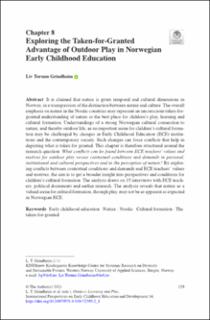| dc.contributor.author | Grindheim, Liv Torunn | |
| dc.contributor.editor | Grindheim, Liv Torunn | |
| dc.contributor.editor | Sørensen, Hanne Værum | |
| dc.contributor.editor | Rekers, Angela | |
| dc.date.accessioned | 2021-09-01T08:24:19Z | |
| dc.date.available | 2021-09-01T08:24:19Z | |
| dc.date.created | 2021-07-31T12:34:17Z | |
| dc.date.issued | 2021 | |
| dc.identifier.citation | Grindheim, L. T. (2021). Exploring the taken-for-granted advantage of outdoor play in norwegian early childhood education. In L. T. Grindheim, H. V. Sørensen, & A. Rekers (Eds.), Outdoor learning and play: Pedagogical practices and children’s cultural formation (pp. 129–144). Cham: Springer International Publishing. | en_US |
| dc.identifier.isbn | 978-3-030-72594-5 | |
| dc.identifier.uri | https://hdl.handle.net/11250/2772138 | |
| dc.description.abstract | It is claimed that nature is given temporal and cultural dimensions in Norway, in a transgression of the distinction between nature and culture. The overall emphasis on nature in the Nordic countries may represent an unconscious taken-for-granted understanding of nature as the best place for children’s play, learning and cultural formation. Understandings of a strong Norwegian cultural connection to nature, and thereby outdoor life, as an important arena for children’s cultural formation may be challenged by changes in Early Childhood Education (ECE) institutions and the contemporary society. Such changes can force conflicts that help in depicting what is taken for granted. This chapter is therefore structured around the research question: What conficts can be found between ECE teachers’ values and motives for outdoor play versus contextual conditions and demands in personal, institutional and cultural perspectives and in the perception of nature? By exploring conficts between contextual conditions and demands and ECE teachers’ values and motives, the aim is to get a broader insight into perspectives and conditions for children’s cultural formation. The analysis draws on 15 interviews with ECE teachers, political documents and earlier research. The analysis reveals that nature as a valued arena for cultural formation, through play, may not be as apparent as expected in Norwegian ECE. | en_US |
| dc.language.iso | eng | en_US |
| dc.publisher | Springer | en_US |
| dc.relation.ispartof | Outdoor Learning and Play Pedagogical Practices and Children's Cultural Formation | |
| dc.relation.uri | https://link.springer.com/content/pdf/10.1007%2F978-3-030-72595-2_8.pdf | |
| dc.rights | Navngivelse 4.0 Internasjonal | * |
| dc.rights.uri | http://creativecommons.org/licenses/by/4.0/deed.no | * |
| dc.subject | early childhood education | en_US |
| dc.subject | nature | en_US |
| dc.subject | Nordic | en_US |
| dc.subject | cultural formation | en_US |
| dc.subject | the taken-for-granted | en_US |
| dc.title | Exploring the Taken-for-Granted Advantage of Outdoor Play in Norwegian Early Childhood Education | en_US |
| dc.type | Chapter | en_US |
| dc.type | Peer reviewed | en_US |
| dc.description.version | publishedVersion | en_US |
| dc.rights.holder | © The Author(s) 2021 | en_US |
| dc.subject.nsi | VDP::Samfunnsvitenskap: 200::Pedagogiske fag: 280::Allmennpedagogikk: 281 | en_US |
| dc.source.pagenumber | 129-144 | en_US |
| dc.identifier.doi | 10.1007/978-3-030-72595-2_8 | |
| dc.identifier.cristin | 1923228 | |
| dc.relation.project | Norges forskningsråd: 275575 | en_US |
| cristin.ispublished | true | |
| cristin.fulltext | original | |

